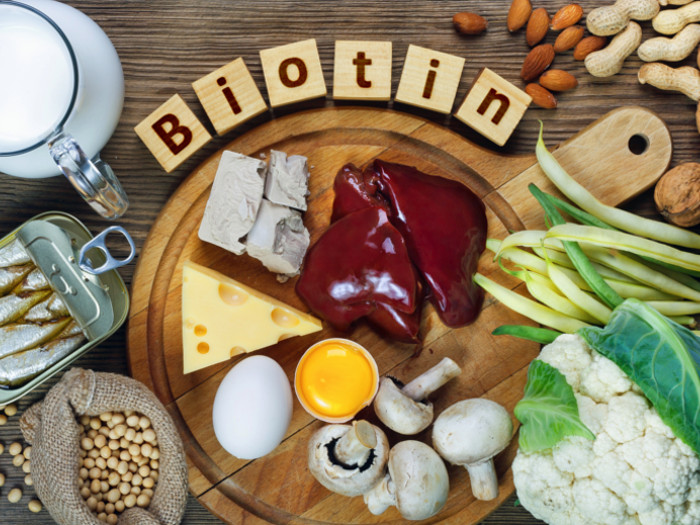Eating biotin foods is a normal part of most diets, but some people need to tailor their intake to increase biotin levels, in some cases.
What is Biotin?
Biotin is one of the many water-soluble B vitamins, commonly referred to as vitamin B7, and plays a key role in the metabolism of food and the production of energy within the body. This vitamin is a critical part of numerous enzymes in the body that are needed to metabolize fats and carbohydrates, and also plays a role in protein synthesis. The body does produce its own vitamin B7, but additional supplementation from food sources is an important part of your daily intake. Furthermore, if it is determined that you are deficient in this key vitamin, taking concentrated supplements is always an option. [1]
Biotin Foods
List of foods rich in biotin mushrooms, spinach, cheese, yeast, salmon, avocado, sweet potatoes, cauliflower, eggs, and almonds, among others.

Eggs, mushrooms, and cheese are some of the common foods rich in biotin. Photo Credit: Shutterstock
Eggs
One boiled egg delivers about 25 micrograms of biotin to the body, roughly 80% of the daily recommendation for adults. [2]
Cauliflower
If you prepare raw cauliflower, eating a single serving will offer approximately 17 micrograms of biotin, which is over half of your daily required amount. [3]
Mushrooms
There are 16 micrograms of biotin per 100 grams of mushrooms, which puts you just over 50% of your daily requirement for this vitamin each day. [4]
Cheese
While different varieties of cheese may be different in biotin content, most contain between 1 and 2 micrograms per ounce; depending on how much cheese you eat, this can help get you to your minimum intake each day! [5]
Almonds
One of the best food sources of biotin, almonds contain nearly 15 micrograms of this vitamin in a 1/4 cup. In other words, eating a half-cup of almonds provides 100% of your necessary intake each day. [6]
Liver
Another very rich source of biotin in food, eating beef liver will deliver between 25 and 35 micrograms of biotin in each 3-ounce serving.
Yeast
This substance can vary widely, but a single packet of brewer’s yeast may contain between 2 and 14 micrograms of this essential B vitamin. [7]
Salmon
Less than many of the other foods, a 3-ounce serving of salmon will contain roughly 5 micrograms, about 18% of your daily requirements. [8]
Avocado
One medium-sized avocado will offer roughly 6 micrograms of biotin, among the many other antioxidants and good fatty acids in this fruit.
Sweet Potatoes
Known as one of the best vegetables for biotin consumption, sweet potatoes deliver 2.5 micrograms per 1/2 cup of cooked sweet potatoes. [9]
Risk Factors
While the body does need biotin foods, there are some risk factors involved in taking supplements of this vitamin, such as the following:
- Gastrointestinal distress
- Nausea
- Cramping
- Diarrhea
Some people experience gastrointestinal distress when using these supplements, including nausea, cramping, and diarrhea. If you have kidney disease or are a smoker, you have a higher risk of biotin deficiency, but it’s best to speak with your doctor before adding this supplement to your health regimen.
